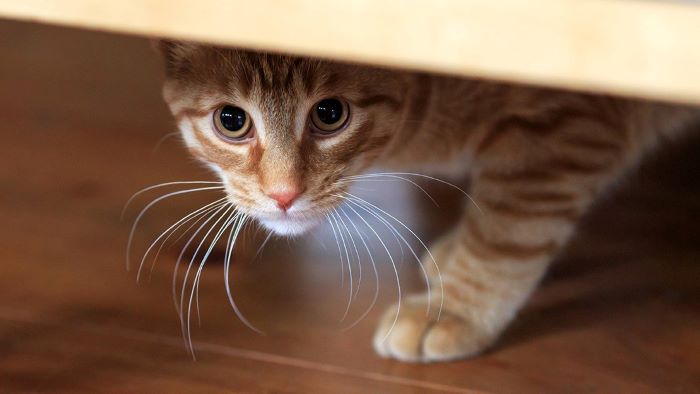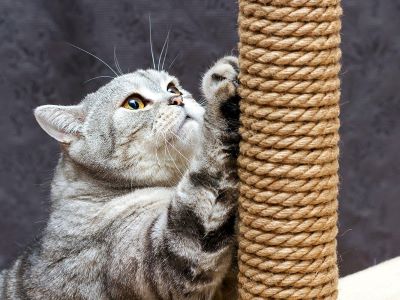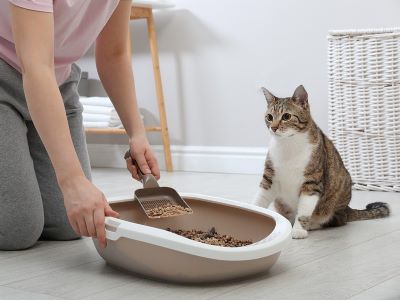It’s quite strange to hear that cats have stress and anxiety too. Well, that’s too common in cats. But the worst levels of stress and anxiety can adversely affect your cat’s health and this can invite a variety of illnesses in your cat.
If your cat’s behavior changes suddenly then probably your cat needs a vet.
Here we are going to discuss stress and anxiety in cats, the signs, and the remedies.
Signs That Your Cat Is Stressed Out
Most of the time, cats signal about being stressed out, you just need to know what signs cats could indicate when stressed. Few of the common signs are discussed further.

- Hiding more than usual
- Becoming less tolerant
- Scratching the furniture
- Excessive meowing
- Growling
- Crouching
- Hesitating to use the litter box
- Eating or drinking less, or overeating
Types of Stress in Cats
Cats do suffer from two different types of stresses. Few stresses don’t last even for a while and we call it Acute stress[1], while some stress can be prolonged and are called Chronic Stress[2].

1] Acute Stress
Acute stress is also termed as ‘short-termed stress’ which may exist for a short duration and can be cured without or with a little help. For example, the sudden noise of something that fell on the ground, this makes your cat stressed due to fear for a while.
2] Chronic Stress
Chronic stress is termed as long termed stress and may require a longer duration and lots of efforts to cure. Usually this stress is common in cats. For example, change in the environment, disturbance in sleep, loud noises etc. can lead your cat to chronic stress and ultimately lead to severe behavior problems or diseases.
Tips to Relieve Your Cat’s Stress
Relieving your cat’s stress is necessary and that can be done with simple tips. Here are few of the tips suggested by vets.
1] Play with you cat regularly
Playing regularly could be helpful for your cat to deal with stress. Interactive games and exercise are found to be the most obliging for cats dealing with stress.

It is advisory to spend at least 20-30 mins couple of times in a day playing with your cat. Some or the other means your cat will definitely appreciate the time with you.
2] Cuddle and love time with you cat
Cats enjoy attention from their owner the most. Spending some time for cuddles, love or some activity with your cat on a daily basis can be a great stress reducer.

3] Establish a scratching area
Scratching surfaces are important to maintain your cat’s health and well-being. Denying your cat to scratch on the scratch area/ post for relief or to mark their territory can result in stress and anxiety.

Provide both horizontal and vertical scratching areas for your cat to scratch. Additional scratching surfaces may be appreciated. And pet owners who have more than one cat at their homes should keep separate scratching areas for different cats.
4] Environment and Resources
Your cat requires a safe space to hide whenever he or she feels threatened. Failing to provide the space can lead to stress, anxiety and extreme panic for your cat.
Provide you cat cat trees, perches or other elevated locations to create a safe and comfortable place for them as this allows them to survey the surrounding area and look for any approaching danger.
5] Quality food and mealtime
Quality food plays an important role in dealing with stress and anxiety as it keeps your cat healthy. Just not this, cats also need to be fed in a measured quantity to protect them from becoming overweight.
Create a peaceful environment during mealtime by keeping the area away from sudden sound and by keeping the feeding bowl and nearby area clean. Additionally, the bowl needs to be of a comfortable shape and size so that your cat’s whiskers don’t get hurt.
Moreover, your cat needs to be protected and fed away from other cats that bully your pet cat in order to avoid stress and anxiety.
6] Happy litter box
Simply providing a litter box is not enough for your pet cat. Size, location, cleanliness and type of litter box matters too. Size of the litter should be 1.5 times the length of your cat from tip of nose to base of tail. Additionally, it must be located in a quiet place that’s convenient and comfortable to access.

Moreover, cleanliness is the most important and the litter box needs to be scooped twice a day to ensure there is enough space for your cat to litter. And multi-cat owners should do the same routine but should keep different litter boxes for each cat.
7] Consistent cat training
Make sure that everyone in the family is on the same page regarding the training of your cat.
For an instance, if your pet is not allowed to sit on the chair by one family member but is permitted by another, then this gives your cat a confusing and stressful message which ultimately results in the weird behavior of your cat.
8] Social Interaction
You should never force your cat to interact socially, allow your kitty to decide if she wants to engage or not. Try to keep things positive. You can offer treats or playtime to be more socially interactive. Most importantly, make her feel loved.
9] Cat communication
In general, all cats are good at communication and most of the time their body language alone can tell you the things going on in their heads. To know what your cat wants to tell you, then observe their body language and what other signs your cat is providing you.
10] Use of anti-stress products
Using stress relievers like medications, pheromones, aromatherapy, calming herbs and cat sprays with your veterinarian’s prescription can help your cat relieve chronic stress. One must stick to natural ways unless and until anti-stress products are advised by the practitioner or the vet.
FAQs
How do I know if my cat is stressed?
Urinating outside the litter box, excessive howling or meowing are the most common stress symptoms for cats. Moreover, cats may eat less or sleep more when stressed
Do cats cry when stressed?
Cats who are stressed, anxious, angry or upset may whine or whimper like humans do. Cats express their emotions by making these noises indicating animal crying.
What is a stressed cat’s body language?
Her head will fall below or at the shoulder level. Additionally, breathing may fasten, may keep the tail low and moreover, she may hold her legs underneath her in a crouched position or may flatten her body on the ground.
Conclusion
Overall, stress is quite common in cats and can be dealt with natural remedies, love and care. Consulting a vet should be taken into consideration in serious cases of chronic stress. You should observe your cat’s body language to avoid your cat’s health getting overlooked.
References:
- Scource, B. (2018, October 5). Stress in cats | International Cat Care. International Cat Care.
- Scource, B. (2018b, October 5). Stress in cats | International Cat Care. International Cat Care.

Brenda Castillo is a volunteer groomer of a local pet welfare group in New York and a regular contributor to CatLikesBest. She likes to read & write about cat grooming. She also guardians two chubby tabbies, Belly & Puma.

